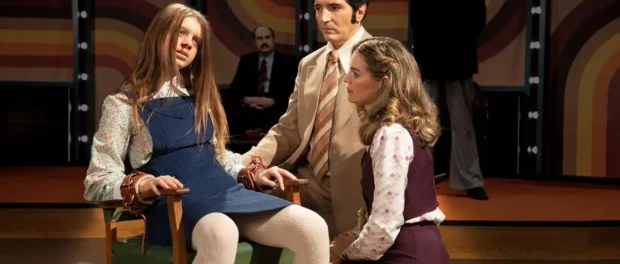Review: Late Night with the Devil
In the early hours on television, there’s a wild charm that captivates, where the luminaries take the stage amidst an eager audience, and the norms loosen in a studio. We’re aware there’s a chance of unfiltered reality, something unexpected, perhaps shocking as the viewers turn on in the darkness of the night. It’s this surreal realm of television that ‘Late Night with the Devil’ delves into, a nerve racking horror film where talk shows and terror meet.
Cameron Cairnes and Colin Cairnes’ film takes place in 1977, In the era Johnny Carson reigned supreme on late-night television.
‘Late Night with the Devil’ introduces Jack Delroy (‘David Dastmalchian’), a Chicago radio host given a shot at breaking into the coveted realm of late night television during the social turmoil of the 1970s in the United States. While Jack’s show, Night Owls, offers a comforting dose of positivity, it falls short of reaching the heights of Johnny Carson. Following a brief overview of Jack and his show’s rise, the narrator unveils the recently unearthed tape of the Night Owls’ live broadcast from Halloween 1977, never before seen behind the scenes footage. The events of this fateful broadcast shook the nation to its core, and now, a new audience is poised to experience the chilling final Night Owls’ show.
Delroy, once a formidable contender in late-night talk shows, now grapples with a stagnant show, even amidst the sympathy following his wife’s demise, unable to rival Carson’s reign. As his program veers towards sensationalism, a Halloween special promises to escalate matters. Alongside Christou the psychic, Delroy welcomes Lilly D’Abo, reputedly harboring a demonic presence, purportedly under the control of parapsychologist Dr. June Ross-Mitchell. Also, Carmichael Haig, formerly known as Carmichael the Conjurer, now a paranormal skeptic joins as the dissenting voice. What could possibly go awry?
Late Night unfolds as found footage, capturing the chaotic events through the show’s cameras, even during commercial breaks. Yet, it transcends the typical trappings of the genre, feeling more like a traditional cinematic experience. Remarkable artistry and production design elevate the film, invoking both horror and nostalgia for the era’s cozy talk shows. Delroy’s enigmatic backstory, a secretive old boys’ club, adds layers of sinister allure.
‘Late Night with the Devil’ poses a challenge for discussion, as it unfolds in “real” time. Jack’s lineup of guests—a psychic portrayed by Fayssal Bazzi, a skeptic formerly a magician played by Ian Bliss, a parapsychologist embodied by Laura Gordon, and the lone survivor of a harrowing Satanic church mass suicide, Ingrid Torelli each contribute to the mounting suspense as the night takes a dark turn. With the skeptic onboard, heated debates ignite regarding the authenticity of the supernatural. Can humans genuinely converse with entities from beyond? Did the devil indeed infiltrate American homes via television waves on that chilling October night in 1977? These questions typically gain a gripping intensity as they unfold “live” on TV, heightening the stakes for everyone involved.
The film artfully blends humor, chills, and a nostalgic nod to that era, delivering a cautionary tale on the hunger of the media for ratings and the unrelenting pressure on celebrities to maintain their prominence by any means. The production design flawlessly resurrects the ambiance of 1970s late-night talk shows. Yet, it’s David Dastmalchian’s performance that is the heart of the movie. Dastmalchian effortlessly channels the essence of a 1970’s talk show host, with warmth and charm, and a sense of sadness as he conceals personal vulnerabilities and doubts as the fate of his show hangs in the balance. In Jack’s world, television ratings dictate everything, and he’s willing to strike a deal with the devil to ensure his show’s success.
Late Night with Devil is playing at the Cinema Moderne (5150 St Laurent) now. Click here for showtimes.






